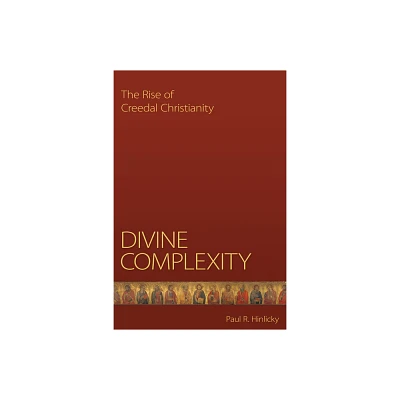Home
Divine Complexity: The Rise of Creedal Christianity
Loading Inventory...
Barnes and Noble
Divine Complexity: The Rise of Creedal Christianity
Current price: $32.00


Barnes and Noble
Divine Complexity: The Rise of Creedal Christianity
Current price: $32.00
Loading Inventory...
Size: OS
*Product Information may vary - to confirm product availability, pricing, and additional information please contact Barnes and Noble
Paul Hinlicky
reads the history of the early church as a genuine, centurieslong theological struggle to make sense of the confession of Jesus' life, death, and resurrection. Protesting a recent parting of the ways between systematic theology and the history of early Christianity, Hinlicky relies on the insights of historical criticism to argue in this historical survey for the coherence of doctrinal development in the early church. Hinlicky contends that the Christian tradition shows evidence of being governed by a hermeneutic of "cross and resurrection." In successive chapters he finds in the New Testament writings a collective Christological decision against docetism; in the union of Old and New Testaments, a monotheistic decision against Gnostic dualism; in the resulting sweep of the canon a narrative of the divine economy of salvation that posed a trinitarian alternative to Arian Unitarianism; and in the insistence upon the cross of the incarnate Son, a rebuke of Nestorianism.
This book is written with the student of early Christianity and the development of doctrine in mind.
reads the history of the early church as a genuine, centurieslong theological struggle to make sense of the confession of Jesus' life, death, and resurrection. Protesting a recent parting of the ways between systematic theology and the history of early Christianity, Hinlicky relies on the insights of historical criticism to argue in this historical survey for the coherence of doctrinal development in the early church. Hinlicky contends that the Christian tradition shows evidence of being governed by a hermeneutic of "cross and resurrection." In successive chapters he finds in the New Testament writings a collective Christological decision against docetism; in the union of Old and New Testaments, a monotheistic decision against Gnostic dualism; in the resulting sweep of the canon a narrative of the divine economy of salvation that posed a trinitarian alternative to Arian Unitarianism; and in the insistence upon the cross of the incarnate Son, a rebuke of Nestorianism.
This book is written with the student of early Christianity and the development of doctrine in mind.


















